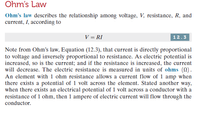
Structural Analysis
6th Edition
ISBN: 9781337630931
Author: KASSIMALI, Aslam.
Publisher: Cengage,
expand_more
expand_more
format_list_bulleted
Question
The electric resistance of a light bulb is 145 Ω . Determine the value of current
flowing through the lamp when it is connected to a 120-volt source.
Using Ohm’s law, as shown , we have
V = RI
I = V/R = 120/145 = 0.83 A

Transcribed Image Text:Ohm's Law
Ohm's law describes the relationship among voltage, V, resistance, R, and
current, I, according to
V = RI
12.3
Note from Ohm's law, Equation (12.3), that current is directly proportional
to voltage and inversely proportional to resistance. As electric potential is
increased, so is the current; and if the resistance is increased, the current
will decrease. The electric resistance is measured in units of ohms (N).
An element with 1 ohm resistance allows a current flow of 1 amp when
there exists a potential of 1 volt across the element. Stated another way,
when there exists an electrical potential of 1 volt across a conductor with a
resistance of 1 ohm, then 1 ampere of electric current will flow through the
conductor.
Expert Solution
This question has been solved!
Explore an expertly crafted, step-by-step solution for a thorough understanding of key concepts.
This is a popular solution
Trending nowThis is a popular solution!
Step by stepSolved in 3 steps

Knowledge Booster
Learn more about
Need a deep-dive on the concept behind this application? Look no further. Learn more about this topic, civil-engineering and related others by exploring similar questions and additional content below.Similar questions
- 8 A 2.05 μC charged ball is placed in an electric field as shown in the figure above. The ball has a mass of 2.46 g. The electric field causes the charge to deflect 22.8°. Find the electric field that causes this deflection. E =arrow_forwardFLUID MECHANICS: THE ENERGY EQUATION: The attached image shows a common consumer product called a water pik. The device uses a motor to drive a piston pump that produces a jet of water (d = 3mm, T = 10oC) with a speed of 25m/s. Estimate the minimum electrical power in Watts that is required by this device. Hints: (a) Assume the power is only used to produce kinetic energy of the water in the jet. (b) In the time interval delta t, the amount of mass that flows out of the nozzle is delta m, and the corresponding amount of kinetic energy is (delta m V2/2)arrow_forward
Recommended textbooks for you

 Structural Analysis (10th Edition)Civil EngineeringISBN:9780134610672Author:Russell C. HibbelerPublisher:PEARSON
Structural Analysis (10th Edition)Civil EngineeringISBN:9780134610672Author:Russell C. HibbelerPublisher:PEARSON Principles of Foundation Engineering (MindTap Cou...Civil EngineeringISBN:9781337705028Author:Braja M. Das, Nagaratnam SivakuganPublisher:Cengage Learning
Principles of Foundation Engineering (MindTap Cou...Civil EngineeringISBN:9781337705028Author:Braja M. Das, Nagaratnam SivakuganPublisher:Cengage Learning Fundamentals of Structural AnalysisCivil EngineeringISBN:9780073398006Author:Kenneth M. Leet Emeritus, Chia-Ming Uang, Joel LanningPublisher:McGraw-Hill Education
Fundamentals of Structural AnalysisCivil EngineeringISBN:9780073398006Author:Kenneth M. Leet Emeritus, Chia-Ming Uang, Joel LanningPublisher:McGraw-Hill Education
 Traffic and Highway EngineeringCivil EngineeringISBN:9781305156241Author:Garber, Nicholas J.Publisher:Cengage Learning
Traffic and Highway EngineeringCivil EngineeringISBN:9781305156241Author:Garber, Nicholas J.Publisher:Cengage Learning


Structural Analysis (10th Edition)
Civil Engineering
ISBN:9780134610672
Author:Russell C. Hibbeler
Publisher:PEARSON

Principles of Foundation Engineering (MindTap Cou...
Civil Engineering
ISBN:9781337705028
Author:Braja M. Das, Nagaratnam Sivakugan
Publisher:Cengage Learning

Fundamentals of Structural Analysis
Civil Engineering
ISBN:9780073398006
Author:Kenneth M. Leet Emeritus, Chia-Ming Uang, Joel Lanning
Publisher:McGraw-Hill Education


Traffic and Highway Engineering
Civil Engineering
ISBN:9781305156241
Author:Garber, Nicholas J.
Publisher:Cengage Learning